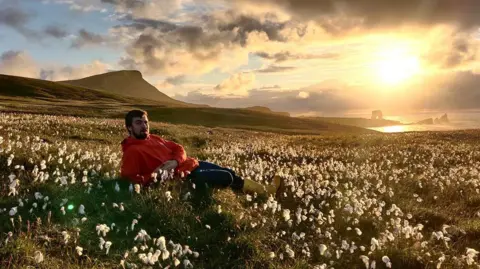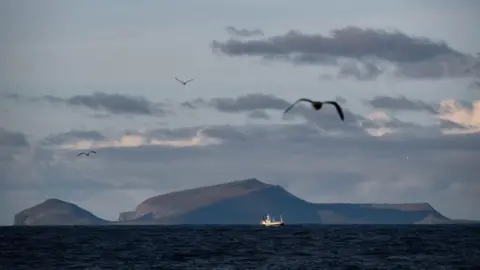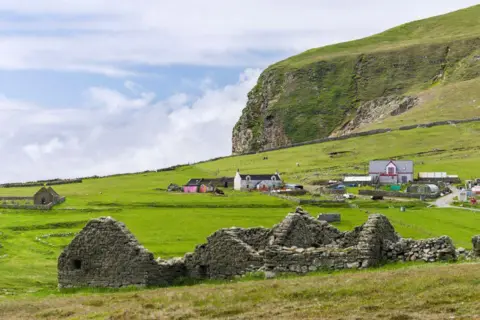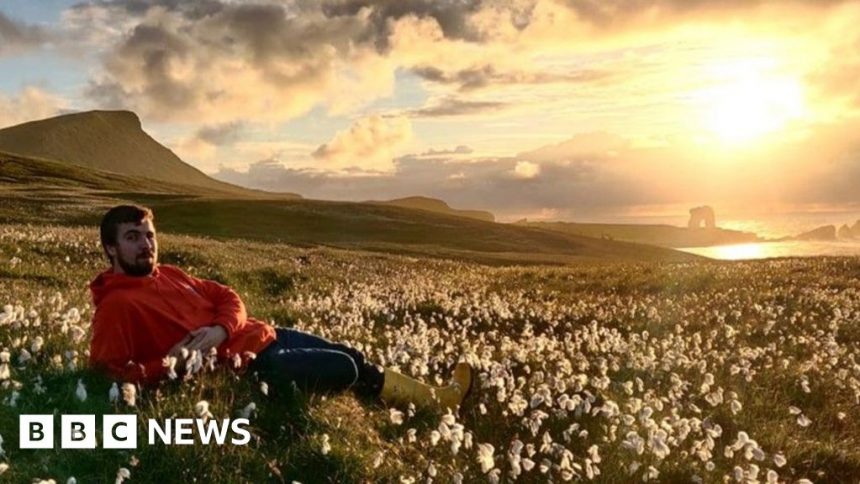Our remote isle celebrates New Year on 13 January
 Robert Smith
Robert SmithA remote Shetland island is celebrating its traditional New Year’s Day – two weeks after other parts of the world.
Foula – which is home to less than 40 people – never fully adopted the modern Gregorian calendar, preferring instead to follow some of the traditions of the Julian calendar.
So this sees islanders celebrate Christmas on 6 January rather than 25 December, and New Year’s Day on 13 January.
“It is how we have always done it,” one islander told BBC Scotland News.
 Getty Images
Getty ImagesMore than four centuries ago, Pope Gregory XIII designed the calendar used today to replace the Julian calendar, which had miscalculated the number of days it takes for the Earth to revolve around the sun.
Foula residents do not follow the Julian calendar as a strict daily rule due to the practicalities of island life, as they have to fit in with things such as plane and ferry timetables.
However Christmas Day and New Year’s Day are different.
Where is the island of Foula?
Foula is about 16 miles from the Shetland mainland and lays claim to being Britain’s most remote inhabited island.
It is less than five miles long, and is powered by wind turbines, hydro energy and solar panels, with generators for back-up.
It is served by a ferry which runs between the island and Shetland, and there are also regular flights from Tingwall Airport, just outside Lerwick, to the island.
The island was one of the last places in Shetland where the old Norn language, a relic of Norse times, was spoken.
The most recent population headcount was 36.
Like many of those islanders, Robert Smith, 27, has a number of roles.
These include crewing the ferry, working at the water treatment plant, doing tours, and delivering mail if needed.
“We do anything and everything,” he said. “You have got to keep busy. Everyone chips in.”
He spent some of his life on mainland Shetland during his education, and has experienced the “best of both worlds” by getting to celebrate two Christmas days and two New Year days in a single 12-month period.
On Foula’s calendar differences, he said: “I think growing up it felt unique.
“But our New Year has similarities with first-footing. You go round houses with a drink, stay a while, and catch up. Then maybe home for dinner and then somewhere for a party into the small hours.
“In Foula it’s family-focussed, it’s more intimate, and we are always playing music together. It’s something the island is known for. It’s a good bonding thing.
“It is how we have always done it.”
He started off on the guitar, then moved onto the mandolin, and is now trying to learn the fiddle, all “just for enjoyment”.
He added: “Christmases are similar, most people stay at home in the morning for presents and spending time together.
“In the past there were maybe different traditions that have slipped away – the men would go out shooting birds to cook.”
What are some of the traditions?
Population levels can fluctuate but Mr Smith described things as being in a healthy place at the moment.
“Most small islands can be older people but we are doing good,” he said.
“We have got a lot of children and young people.
“I think Foula has a very relaxed and independent feel, there is no-one breathing down your neck.”
For New Year’s Day he said he would follow in the traditions he had learned from his mother and grandmother – doing a bit of something you want to do well in for the rest of the year.
This could perhaps include crofting work, or gardening, or fishing.
“It’s a token effort to bring good fortune,” he said.
“I have a croft house I am trying to do up, so I might do some plastering.”
 Getty Images
Getty ImagesAnother islander, who preferred not to be named, said: “Yule Day on the 6th works in a fairly similar way to the 25th for most folk.
“The things that are unique are we make an effort to go round every house for music and singing, and a big party.
“It feels less commercialised, and rooted in traditions. It’s important to maintain these old traditions.”
Islanders were lucky enough to have a “kind of” white Christmas this year amid a thaw, he said, with some snow still on the hills.
‘For good luck’
“And New Year is not Hogmanay like the rest of the country, with the 13th being the equivalent of the 1st,” he explained.
“Everything is the same as Yule Day, with a big party at the end of the evening.”
The crofter echoed: “We try to do a little bit of everything for the year ahead, a small amount of each job you are involved in.
“And I would go and collect some driftwood from the shore, which is a tradition, for good luck.”








